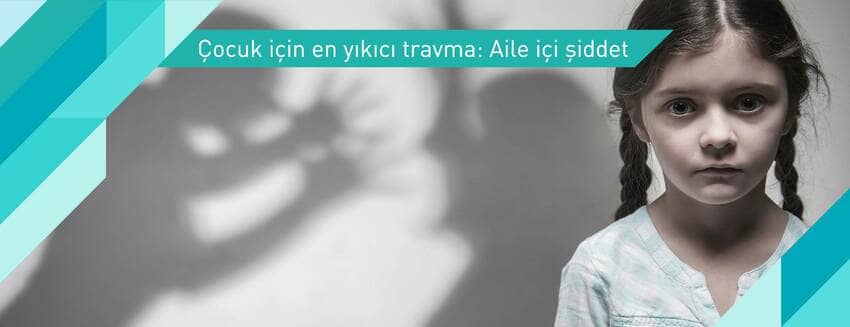
Mental problems become inevitable for children exposed to violence. "The type and severity of the trauma is as important as the person by whom it is created," experts said, emphasizing that the most destructive trauma for children is violence inflicted by the family.
Providing information about the mental changes seen in children exposed to violence in the family, Üsküdar University Np Feneryolu Medical Center Child - Adolescent Psychiatry Specialist Assist. Assoc. Prof. Dr. Başak Ayık said, "The negative effects of any type of violence in the family, both against the child himself/herself and other members of the family, are quite high."
Psychological and physical violence deeply shakes the mental structure
"Violence, regardless of its type, is undoubtedly a trauma. Traumas are events that negatively affect the individual mentally and physically and make them feel helpless. The effects of psychological or physical violence shake the mental structure deeply," said Asst. Assoc. Prof. Başak Ayık,
"The type and severity of the trauma has a significant impact on the impact it has on the individual, as does the person by whom it is inflicted. For children, the most devastating traumas are those inflicted by their parents, who have the duty to protect and care for them, and by their family, which forms the basis of their bonds of trust. Through their parents and family, children learn their social and societal roles and develop patterns of behavior. The family is a very important structure where the basic sense of trust is formed and the foundations of the bonds that the individual will establish throughout life are laid. Based on this information, you can draw the idea that the effects of domestic violence on the individual cannot be underestimated and underestimated. The negative effects of any type of violence in the family, both against the child and other members of the family, on the child are quite high."
The main changes seen in children: Sleep and appetite problems
"Individuals who have been traumatized may experience a number of mental symptoms and problems both in the short and long term," said Asst. Assoc. Prof. Başak Ayık and continued her words as follows
"The most common changes in traumatized children are symptoms related to sleep and appetite. Deterioration in sleep quality and regularity, nightmares may be observed. Loss of appetite and weight loss are common. One of the important symptoms is sudden changes in mood. In other words, after the traumatic event, the child's behavior changes compared to the previous period. His/her anxiety level increases, new fears may emerge, he/she may not want to leave his/her mother or father. There may be a decrease in school success and attention. Some children may become more irritable and tense as a reaction. They may exhibit negative behaviors they have never done before. If the child is exposed to physical trauma as well as psychological trauma, there may be retardation in physical development.
Children take violence as an example
The child begins to use violence in his/her own social life by modeling this method chosen by his/her parents as a problem-solving method. Over time, he/she starts to receive complaints from school and social circles about his/her violent behavior. He/she feels anger towards the parent who inflicted violence on him/her and their communication progresses negatively. Domestic violence does not only have to be directed against the child for it to affect the child negatively. Violence against the mother and other members of the family also leaves deep scars on the child's mental world. They may experience serious problems in their relationships with their parents and even in their gender roles."
Healthy communication in the family is of great importance
"In children who have been subjected to physical violence outside the family, scars on the body can give families an idea. If the perpetrator of violence has threatened and intimidated the child, the child may be afraid to share this with his/her family. However, parents who have healthy communication with their children can somehow learn this information without hurting them." Başak Ayık said, "In some cases, violent behaviors can also be observed in children who have not been exposed to violence or who have not modeled domestic violence behavior. In other words, the view that 'every child who is violent is exposed to violence at home' is an erroneous view. We can talk about two main problems in these children. The first one is 'boundary problems' and the other one is 'impulse control problems'."
Wrong attitudes lead to boundary problems in children
Assist. Assoc. Prof. Dr. Başak Ayık said, "Children with boundary problems are children who have not received appropriate feedback from their parents about their boundaries when necessary" and expressed her thoughts in the following sentences: "We can briefly call these children 'children who have not learned or been taught where to stand'. In the face of oppressive parental attitudes, some parents raise their children independent of social norms by failing to strike a balance between pressure and appropriate boundaries. They think that these unlimited behaviors are to raise children who express themselves freely and are self-confident. However, one of the most fundamental tasks of every parent is to raise their child as a socially accepted and happy individual in the future. For this, they should explain to them how to behave in accordance with social norms and how to be individuals who do not interfere with other people's freedoms.
Children with impulse control should seek professional support
Children with impulse control problems have trouble stopping their wrong impulses. In other words, they have trouble stopping themselves before they do any wrong behavior that comes to their mind. They also regret the action after they have done it. These children need professional support in this regard. Because violence is not a normal and acceptable behavior. These behaviors will cause the child to be excluded from social environments and to be alone."
